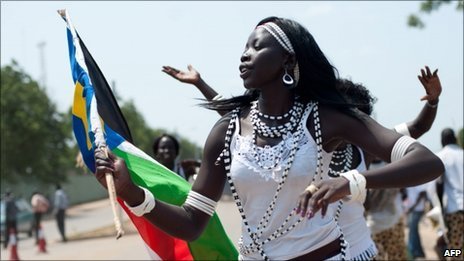South Sudan: How long will the smiles last?
Sud Sudan Independence

The excitement of South Sudan's independence is not confined to the new capital, Juba.
"July the ninth means a lot to me. When we were ruled by Khartoum there was no education for our children. We want to rule ourselves," boomed Paul Modi, the chief of Loi village - a small fishing community on the banks of the River Nile.
On the radio was a song praising those who fought during the lengthy civil war. The man who led the South Sudanese rebels died in 2005 but his portrait still hangs in many offices, shops and homes.
Men and women marched through the dusty streets of Terakeka singing: "I will never leave my land till I die." A much repeated chorus throughout the decades of civil war. Hands on hearts they belted out the anthem for the new nation.
"Our parents and grandparents were suffering for so long because of war. They brought us independence and so I thank them and I thank God," secondary school student Sarah Keji told me. Expectations here are high and the wish list is as long as the Nile.
"After independence, life will be better than before. We are going to see justice, prosperity and our country will develop," she said.
Confiscated machetes
But for every optimist I have met in South Sudan I have bumped into many people, mostly visitors, predicting doom and gloom after independence.
Then there are the internal conflicts in South Sudan - armed rebellions and clashes over cattle which have killed more than 1,500 people this year.
Two years ago I drove north of Juba through Terakeka County past burnt villages and camps for people displaced by inter-ethnic violence.
Now this area is far more peaceful thanks to a disarmament exercise - a staggering 10,000 guns were collected in this county alone.
Ahead of the independence celebrations the army went on house-to-house searches.
For there to be peace in South Sudan depends to a great extent on the relationship between the two after the divorce.
Right now the signs are not good with tension along the oil-rich border.
"Life in South Sudan is likely to be precarious for some years to come," says Sudan expert and academic Douglas Johnson.
"As long as the main priority of the government of South Sudan is maintaining security, especially along the border region, the less it will be able to focus on delivering the types of services and development the populace expects," he says.
With 75% of the known oil deposits in the south, the Khartoum government's economy is about to be hit hard. The oil-rich border has still not been demarcated so fighting for control of the oil fields is still a possibility, although the Khartoum government would then be taking on a recognised nation.
Although agriculture has great potential here, more than 95% of the southern government's revenue comes from oil.
For now it all flows north so the relationship needs to be good. But the mistrust and suspicion run deep.
Just as the country is trying to get on its feet, alarm bells are already sounding over corruption, tribalism and signs of autocratic rule. The question is how long the smiles will last after the party.


 Votes : 0
Votes : 0









